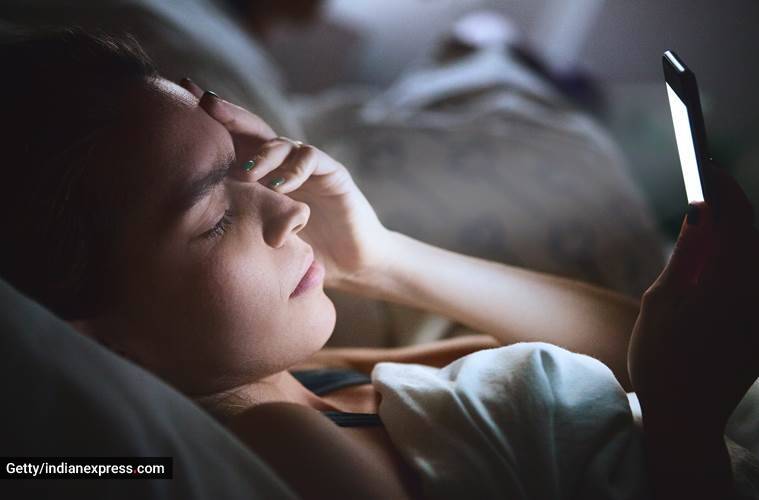📣 For more lifestyle news, click here to join our WhatsApp Channel and also follow us on Instagram
What happens to your mind and body when you don’t sleep for 3 days?
"The impacts of sleep deprivation can become evident in most individuals within a mere 24 hours. However, when one goes without sleep for a continuous period of 72 hours or three days, the symptoms of deprivation and fatigue intensify even further," Dr Suresh Ramasubban said
 Sleep deprivation has become a prevalent issue among students and professionals, with many facing its challenges (Source: Getty Images)
Sleep deprivation has become a prevalent issue among students and professionals, with many facing its challenges (Source: Getty Images) Sleep is of utmost importance for our overall well-being and health. It plays a crucial role in various aspects of our lives, including cognitive function, mental well-being, and physical health. But for many, finding restful sleep can be a challenge. Occasionally, some individuals may even find themselves going without sleep for consecutive days, which can have significant impacts on their health. This led us to wonder how exactly your mind and body can be affected if you do not sleep for three days in a row!
We reached out to experts who delved deeper into the same. “Three days without sleep causes major changes in a person’s health and body as well as a number of harmful impacts. Sleep deprivation can have both short-term and long-term effects. It affects both physical health and mental health of the person in a number of ways,” Dr Vipul Gupta, chief, Neurointerventional Surgery, and co-chief, Stroke Unit, Artemis Hospital, Gurugram said.
Agreeing, Dr Suresh Ramasubban, consultant, Pulmonary and Critical Care Medicine, and in-charge of Intensive Care Unit and Sleep Lab, Apollo Multispeciality Hospital, said that the impacts of sleep deprivation can become evident in most individuals within a mere 24 hours. However, when one goes without sleep for a continuous period of 72 hours or three days, the symptoms of deprivation and fatigue intensify even further, he added.
“The consequences of staying awake for such an extended period can have profound effects on a person’s mood and cognitive abilities. Sleep deprivation has become a prevalent issue among students and professionals, with many facing its challenges. Even as doctors, we are restricted from working for more than a 24-hour shift due to the potential for errors. Engaging in repetitive tasks during prolonged wakefulness becomes hazardous, as logical reasoning, mathematics, and other cognitive functions are impaired,” he said.
 Avoid stimulating activities, caffeine, and electronic devices close to bedtime (Source: Getty Images)
Avoid stimulating activities, caffeine, and electronic devices close to bedtime (Source: Getty Images)
Some of the effects resulting from this level of sleep deprivation include extreme fatigue, difficulty in multitasking, significant challenges in concentration and memory retention, feelings of paranoia, a depressed mood, and difficulties in interpersonal communication. “It is crucial to recognise that chronic sleep deprivation can have enduring implications for an individual’s overall health. Such effects may include increased susceptibility to conditions like high blood pressure, obesity, diabetes, heart disease, anxiety, and depression,” Dr Ramasubban said.
The expert further shared that the effects of sleep deprivation can be particularly hard on respiratory physiology. “Our body and brain stem fail to recognize a decrease in oxygen levels and an increase in carbon dioxide levels. This condition is known as a depressed ventilatory response to low oxygen and high carbon dioxide, and individuals with lung diseases may experience worsened symptoms as a result,” he said.
As for mental health, sleep is a phase when the brain forms connections or synapses which help us in forming memory, Dr Kapil Singhal, director, Neurology, Fortis Hospital, Noida said. As such, poor sleep can impair our ability to remember. “It can lead to mood swings, irritability, and anger issues which negatively impact our day-to-day working. It can even lead to hallucinations if sleep loss is prolonged and will lead to a negative impact on physical health. Sleep is as essential for the brain as food and oxygen for living,” he said.
However, there can be various reasons why someone may not end up sleeping for 2-3 days at a stretch. It could be due to underlying medical conditions like insomnia, anxiety, or sleep disorders. External factors such as high-stress levels, work or study demands, jet lag, or unhealthy sleep habits can also contribute to prolonged sleeplessness. Whatever the reason may be, going without sleep for three consecutive days accumulates a substantial sleep debt.
“While catching up on sleep is undoubtedly essential, it is not the only solution. The most effective approach is to strive for a healthier and more balanced lifestyle,” Dr Ramasubban said.
Dr Singhal said if a person ends up having a prolonged sleep loss, s/he should avoid using stimulants like caffeine, and tea. “A short relaxing sleep can also be helpful. One should fall back to his usual sleep pattern as soon as possible. Light exercises and mind relaxation techniques like meditation can also be helpful,” he said.
To ensure proper sleep amid a hectic schedule, it is important to prioritise and establish a consistent sleep routine. By following these steps, you can optimise your experience and improve your chances of achieving restful sleep:
*Set a regular sleep schedule, going to bed and waking up at the same time every day.
*Create a conducive sleep environment that is cool, dark, and quiet.
*Avoid stimulating activities, caffeine, and electronic devices close to bedtime.
*Practice relaxation techniques, such as deep breathing or meditation, to unwind before sleep.
*Regular exercise and a balanced diet can also promote better sleep.
📣 For more lifestyle news, follow us on Instagram | Twitter | Facebook and don’t miss out on the latest updates!
📣 For more lifestyle news, click here to join our WhatsApp Channel and also follow us on Instagram





- 01
- 02
- 03
- 04
- 05






















